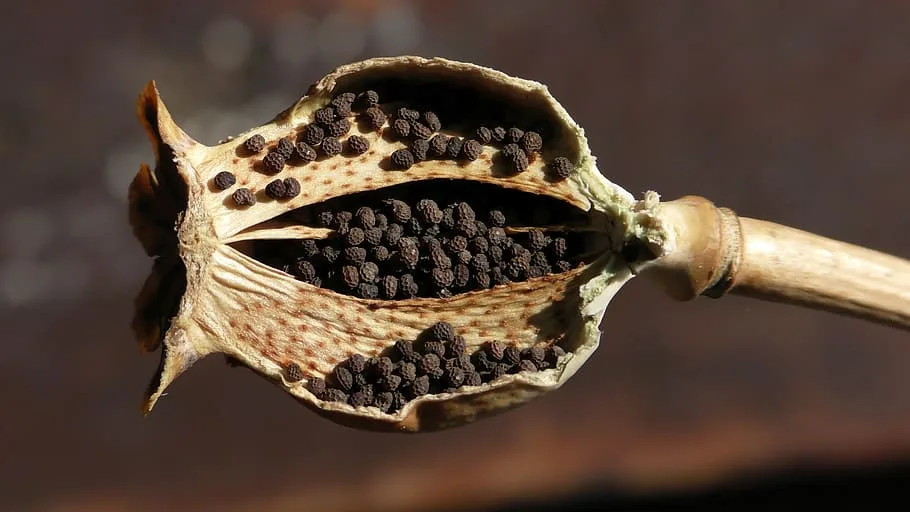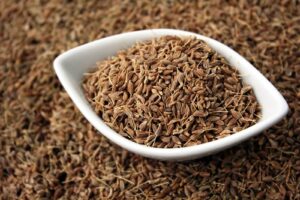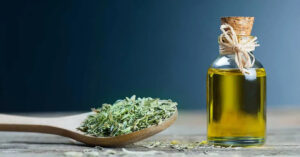Poppy seeds have captivated cultures around the world for centuries, with their unique flavor, nutritional value, and historical significance. Derived from the opium poppy (Papaver somniferum), these tiny black seeds are not only used in culinary delights but also valued for their medicinal properties.
In this comprehensive article, we will delve into the captivating history of poppy seeds, explore their origin, types, composition, world production benefits, appropriate dosage, different ways to consume them, how to obtain them, possible side effects, necessary precautions while using them, and conclude with a section of frequently asked questions.

The Ancient Origins of Poppy Seeds
Poppy seeds, the tiny blue or black specks that dot pastries and spice up curries, boast a history as rich and complex as their flavor. Their journey from ancient fields to modern kitchens is a fascinating tale of cultural exchange, medicinal exploration, and culinary innovation.
Early Encounter By Sumerians (3400 BCE)
Our edible adventure begins in the cradle of civilization, Mesopotamia. Around 3400 BCE, the Sumerians, masters of irrigation and agriculture, cultivated the opium poppy for its sap, later known as opium. But they also recognized the nutritional potential of the seeds, calling them “hul gil,” meaning “joy plant.”
Spreading Like Pollen on the Wind (2700 BCE – 16th Century)
The poppy’s allure traveled with trade routes. The Minoans on Crete used poppy milk to soothe babies, while Egyptians included the seeds in offerings to their gods. By the Bronze Age, poppies had bloomed across Europe, gracing the tables of Greeks, Romans, and eventually, Celts. They even made their way east, becoming a staple in Indian and Chinese cuisine.
A Mix of Medicine and Misconceptions (16th Century – 19th Century)
The opium poppy’s dual nature – source of both food and narcotic sap – created a complex narrative. European explorers like Sir John Mandeville brought back tales of opium’s medicinal and recreational properties, leading to widespread use (and misuse) in the 18th and 19th centuries. However, the addictive nature of opium cast a shadow on the innocent poppy seeds, leading to regulations and restrictions in some countries.
Poppy Power in the Modern World (20th Century – Present)
Despite the lingering association with opium, poppy seeds have carved a respectable space in the modern pantry. In Europe, they add texture and crunch to breads and pastries. In India, poppy seed paste or “khus khus” flavors curries and sweets. Even poppy seed oil, with its delicate nutty aroma, finds its way into salad dressings and stir-fries.
A Legacy of Flavor and Resilience (Looking Ahead)
Today, they stand as a testament to human ingenuity and the enduring power of food. From ancient rituals to modern meals, they have traversed continents, defied stereotypes, and proven themselves worthy of our palate. So, the next time you sprinkle them on your muffin or stir them into your curry, remember – you’re not just enjoying a flavor, you’re savoring a slice of history.
Different Types of Poppy Seeds
There are various types of poppy seeds available, each with its own unique characteristics and applications. Some popular varieties include:
• Hungarian Blue: Known for their intense flavor and high oil content, Hungarian Blue poppy seeds are widely used in baking.
• Indian White: These seeds have a slightly nutty taste and are often used in Indian cuisine.
• Dutch Blue: Dutch Blue poppy seeds are smaller in size and have a milder flavor compared to other varieties.
• Persian White: These seeds are larger than average and have a distinct sweet flavor.
Health Benefits
Poppy seeds, the tiny black or blue specks often found sprinkled on baked goods, are more than just a culinary add-in. These nutritional powerhouses boast a wealth of health benefits, making them a worthy addition to your diet. Let’s delve into the world of poppy seeds and explore the reasons why you should consider incorporating them into your meals.
Nutritional Powerhouse:
Poppy seeds have numerous nutrients which are essential for the overall wellbeing :
Minerals: Calcium, magnesium, manganese, phosphorus, and iron. These minerals contribute to strong bones, efficient blood clotting, and healthy red blood cell production.
Fiber: A good source of both soluble and insoluble fiber, aiding digestion, promoting satiety, and potentially lowering cholesterol levels.
Healthy Fats: Rich in omega-6 and omega-9 fatty acids, which have been linked to improved heart health and reduced inflammation.
Antioxidants: Poppy seeds contain various antioxidants, including polyphenols, which may help protect cells from damage and reduce the risk of chronic diseases.
Protein: A decent source of plant-based protein, essential for building and repairing tissues.
| Nutrient | Amount | % Daily Value (DV) |
|---|---|---|
| Calories | 46 | 2% |
| Fat | 3.7 g | 6% |
| • Saturated | 0.4 g | 2% |
| • Unsaturated | 3.3 g | 6% |
| • Omega-3 | 0.2 g | 1% |
| • Omega-6 | 2.8 g | 3% |
| Carbohydrates | 2.5 g | 1% |
| • Fiber | 1.7 g | 7% |
| • Sugars | 0.4 g | <1% |
| Protein | 1.6 g | 3% |
| Vitamins | ||
| • Thiamine (B1) | 0.05 mg | 4% |
| • Niacin (B3) | 0.4 mg | 2% |
| • Pantothenic Acid (B5) | 0.1 mg | 1% |
| • Pyridoxine (B6) | 0.07 mg | 4% |
| • Folate | 11 mcg | 3% |
| • Vitamin E | 0.04 mg | 0.3% |
| Minerals | ||
| • Calcium | 35 mg | 3% |
| • Copper | 0.1 mg | 10% |
| • Iron | 0.6 mg | 4% |
| • Magnesium | 9.7 mg | 2% |
| • Manganese | 0.2 mg | 26% |
| • Phosphorus | 69 mg | 5% |
| • Potassium | 64 mg | 2% |
| • Zinc | 0.2 mg | 2% |
The impressive nutritional profile of poppy seeds translates into a multitude of potential health benefits:
Improved Bone Health: The richness of calcium, magnesium, and manganese in poppy seeds makes them beneficial for bone health and mineral density. This can be especially helpful for preventing osteoporosis and fractures.
Enhanced Digestion: The high fiber content in poppy seeds promotes smooth digestion, prevents constipation, and nourishes the gut microbiome.
Heart Health Hero: The combination of healthy fats, antioxidants, and fiber in poppy seeds may contribute to lowering bad cholesterol levels, reducing inflammation, and protecting against heart disease.
Diabetes Management: Poppy seeds have a low glycemic index, meaning they release sugar slowly into the bloodstream. This can be beneficial for managing blood sugar levels and preventing spikes in insulin.
Cancer Prevention: The antioxidant and anti-inflammatory properties of poppy seeds may offer some protection against certain types of cancer. However, more research is needed to substantiate the claims.
Boosted Immunity: The presence of iron, vitamin E, and zinc in poppy seeds can support a healthy immune system and help fight off infections. Constipation Relief: Poppy seeds, according to some reports help relieve constipation, though there is no proof to substantiate the claim.
Appropriate Dosage of Poppy Seeds
While poppy seeds offer various health benefits, it is crucial to consume them in moderation. The recommended daily dosage for adults is approximately 1 to 2 tablespoons (15-30 grams). It’s essential to consult with a healthcare professional or nutritionist regarding specific dosage requirements based on individual factors such as age, health condition, and dietary needs.
Different Ways to Consume Poppy Seeds
Poppy seeds can be incorporated into your diet in numerous ways. Here are some popular methods:
• Baking: Add poppy seeds to bread doughs, muffins, cookies, or cakes for an extra burst of flavor.
• Salad Toppings: Sprinkle poppy seeds over salads to enhance both taste and texture.
• Smoothies: Blend poppy seeds into your favorite smoothie recipes for a nutritional boost.
• Curries and Sauces: Poppy seeds can be ground into a paste or added whole to curries and sauces for depth of flavor.
Obtaining Poppy Seeds
Poppy seeds are readily available in most grocery stores, health food stores, and online platforms. When purchasing poppy seeds, ensure they are fresh, properly packaged, and from a reputable source. Opt for organic varieties whenever possible to minimize exposure to pesticides or chemical residues.
8. Possible Side Effects and Precautions while Using Poppy Seeds
While poppy seeds offer numerous health benefits, it is essential to be aware of potential side effects and exercise caution when consuming them:
• Allergies: Some individuals may be allergic to poppy seeds. If you experience any adverse reactions such as itching, swelling, or difficulty breathing after consuming poppy seeds, seek medical attention immediately.
• Interaction with Medications: Poppy seeds may interact with certain medications such as sedatives or painkillers. Consult your doctor if you are on any medication as they may interfere with certain meications.
• Pregnancy and Breastfeeding: Pregnant women or those who are breastfeeding should exercise caution when consuming poppy seeds due to their potential effects on the central nervous system.
• Gluten Sensitivity: While poppy seeds themselves do not contain gluten, cross-contamination may occur during processing. Individuals with gluten sensitivity should opt for certified gluten-free products.
Poppy Seeds: Adding Flavor to Dishes Worldwide
Poppy seeds, those diminutive black or blue specks, seem unassuming at first glance. But step onto the global culinary stage, and you’ll find them sprinkled across a breathtaking variety of dishes, adding pops of texture, nutty aromas, and subtle complexities to flavors. Let’s embark on a delicious journey, exploring how poppy seeds weave their magic into cuisines around the world:
Central Europe: In Austria, Hungary, and Slovenia, poppy seeds find their way into potica, a sweet yeasted bread roll traditionally filled with nuts, dried fruit, and, of course, poppy seeds.
Germany: Across Germany, poppy seeds add crunch and nutty richness to stollen bread, a fruit- and nut-studded Christmastime favorite.
Scandinavia: In Sweden, semlor, sweet cardamom buns filled with almond paste and topped with poppy seeds, are a cherished Easter tradition.
Finland: Poppy seeds add a contrasting texture to Finnish karjalanpiirakka, savory pastries filled with rice and potato or cheese.
Asia: From Savory Stews to Dessert Delights
India: In Indian cuisine, poppy seeds, known as khus khus, lend their earthy notes to stews like korma and mahi methi. They also take center stage in makhana malai, a creamy dessert featuring poppy seeds and lotus seeds.
Southeast Asia: In Malaysia and Singapore, poppy seeds bring a subtle nuttiness to nasi lemak, the iconic coconut rice dish often served with fragrant curries and sambal.
Turkey: Turkish popyaça features a sweet filling made with poppy seeds, ground walnuts, and spices, wrapped in crispy filo pastry.
Mexico: In Oaxaca, Mexico, tejas, tiny sesame seed candies, are sometimes flavored with poppy seeds for a unique twist.
Middle East: In some parts of the Middle East, halva, the classic sesame and nut candy, gets a poppy seed makeover, offering a new textural experience.
North America: In the United States, poppy seeds lend their crunch and subtle flavor to lemon poppy seed muffins, a beloved breakfast and snack.
Poppy seeds add more than just visual appeal to these dishes. They contribute:
Texture: Their tiny size offers a delightful crunch, contrasting with softer breads and richer sauces.
Nutty Aroma: Poppy seeds possess a delicate, earthy nuttiness that enhances the overall flavor profile.
Subtle Bitterness: In some dishes, poppy seeds can lend a hint of bitterness, adding complexity and balance.
Nutritional Value: Poppy seeds are a good source of calcium, manganese, and fiber, offering a hidden health boost.
Poppy Seeds: A Global Culinary Adventure Awaits
So, the next time you encounter poppy seeds on a menu or in the grocery aisle, remember the rich culinary journey they’ve undertaken. From European breads to Indian stews, these tiny globetrotters add layers of flavor and texture, inviting you to embark on a global gastronomic adventure, one bite at a time.
Tips for Exploring Poppy Seed Delights:
If you’re new to poppy seeds, start by adding them to familiar dishes like yogurt or oatmeal.
Experiment with different types of poppy seeds: white, black, or blue, each offering slightly different nuances of flavor.
Look for poppy seed-infused ingredients like oils and vinegars to add a subtle poppy seed touch to your cooking.
Be mindful of local regulations regarding poppy seeds when traveling abroad.
With a little curiosity and a sprinkle of poppy seeds, your culinary world will expand in surprising and delicious ways. So, go forth and explore the exciting possibilities these tiny treasures offer!
Legal Validity Around The World
Poppy seeds, those tiny black or blue specks adding flavor and crunch to our food, offer a fascinating paradox. While cherished for their culinary and nutritional value, their association with the opium poppy casts a long shadow, influencing their legal status across the globe. Let’s embark on a journey around the world, exploring the diverse legal landscapes surrounding these versatile seeds.
Europe: A Mixed Bag Allowing Only Traces
Permitted with Traceability: Most European countries, including Austria, France, and Germany, allow the sale and consumption of poppy seeds as long as their morphine content remains below a specific threshold. This threshold varies by country, ranging from 0.01% to 0.05%. Traceability requirements are often in place, ensuring poppy seeds originate from low-morphine varieties.
Exceptions and Restrictions: Countries like the Netherlands and Hungary completely ban the cultivation of poppies for seed production. Czech Republic requires specific licenses for both cultivation and possession of poppy seeds.
The Americas: A Patchwork of Regulations
Canada and the United States: Both countries strictly regulate poppy seeds. In Canada, possession of any part of the opium poppy, including seeds, is illegal. The United States allows poppy seeds for culinary purposes but requires they be processed to minimize morphine content.
South America: The legal landscape varies within South America. Argentina and Brazil permit poppy seeds with regulations, while Bolivia, the world’s largest producer of coca leaves, also allows poppy cultivation under strict controls.
Asia: A Tapestry of Traditions and Restrictions
India and Pakistan: Poppy seeds are deeply ingrained in culinary traditions, used in breads and sweets. However, strict regulations are in place due to concerns about potential drug extraction.
Middle East: Countries like Saudi Arabia and the United Arab Emirates have complete bans on poppy seeds and poppy-derived products due to religious and drug control considerations. Travelers passing through these regions should exercise extreme caution.
Southeast Asia: Singapore prohibits poppy seeds due to their morphine content. Taiwan allows them but restricts imports to prevent cultivation for opium production.
Africa: A Continent with Limited Information
Poppy seed regulations in Africa remain largely unclear, with limited information available for many countries. It’s advisable to exercise caution and consult local authorities before carrying or consuming poppy seeds in the region.
Precautions While Travelling
Research local regulations: Before traveling to any country, research their specific laws regarding poppy seeds. Ignorance can lead to serious consequences, including arrest and imprisonment.
Declare at customs: When carrying poppy seeds internationally, always declare them to customs officials. Honesty and transparency are crucial to avoiding legal trouble.
Opt for alternatives: If unsure about local regulations, consider choosing alternative ingredients for your culinary adventures. Peace of mind is always the tastiest spice.
Remember, legal landscapes can change quickly, so staying informed and exercising caution are key to enjoying poppy seeds around the world. Now, armed with this knowledge, you can savor the flavor and cultural heritage of these tiny treasures while respecting the diverse legal boundaries that define their journey.
Beyond the Legalities: A Note on Responsible Consumption
While legal restrictions are crucial for controlling illicit drug production, it’s important to recognize that poppy seeds, when consumed responsibly, pose minimal health risks. Their nutritional value and culinary versatility deserve appreciation. Therefore, striking a balance between legal safeguards and responsible enjoyment is essential for navigating the complex world of poppy seeds.
By understanding the legal intricacies and practicing responsible consumption, we can continue to appreciate the multifaceted wonder of these tiny seeds, savoring their flavor and history across the globe.
In conclusion, the history of poppy seeds is deeply intertwined with human civilization. From their ancient origins and diverse types to their nutritional composition and worldwide production benefits, these tiny black seeds have left an indelible mark on our culinary traditions and holistic well-being. By understanding appropriate dosage, various consumption methods, obtaining quality sources, possible side effects, and necessary precautions while using them, we can fully appreciate the wonders that poppy seeds have to offer while prioritizing our health and safety.
Frequently Asked Questions (FAQs)
Q1: Can consuming poppy seeds make you fail a drug test?
A1: While consuming small amounts of poppy seeds typically does not result in a positive drug test for opiates, it is advisable to avoid poppy seed consumption before undergoing drug screenings.
Q2: Are poppy seeds addictive?
A2: Unlike opium or processed drugs derived from the opium poppy plant, consuming moderate amounts of poppy seeds is not considered addictive.
Q3: Can poppy seeds be used as a natural pain reliever?
A3: Poppy seeds contain alkaloids that have mild analgesic properties; however, they should not be considered a substitute for proper medical treatment or prescribed pain medication.
Q4: Are there any age restrictions for consuming poppy seeds?
A4: While there are no specific age restrictions for consuming poppy seeds, it is advisable to consult with a pediatrician before introducing them into a child’s diet.
Q5: Can I store poppy seeds long-term?
A5: To ensure freshness and maintain their nutritional value, store poppy seeds in an airtight container in a cool, dark place away from direct sunlight. They can typically be stored for up to six months.
Reference : http://www.webmd.com







